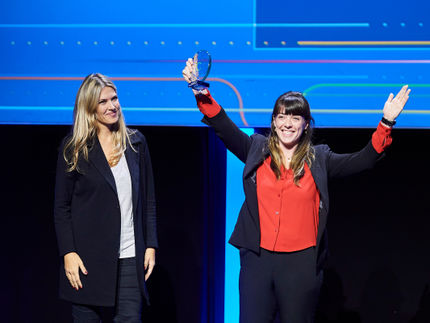IDEAward for researchers’ start-up ideas
Teams from informatics, environmental engineering and medicine
An AI-controlled construction robot, a CO2 conversion process and a test to detect head and neck tumors: These three promising start-up ideas from researchers are the latest winners of the TUM IDEAward.
Which ideas can be turned into successful products? What start-up team is addressing the challenges facing society? Which start-up will create sustainable value in the future?
In the final round of the TUM IDEAward, 10 teams aiming to launch start-up companies presented their ideas to the public. The award for the best ideas is granted by the Technical University of Munich (TUM), UnternehmerTUM, the Center for Innovation and Business Creation, and the Zeidler Research Foundation, which provides a total of 37,500 Euros in prize money. The winners also receive individual coaching from TUM Start-up Consulting up to the time of market launch.
First place: Aiina Robotics
The construction industry is struggling with high costs and skills shortages. To address these issues, Aiina Robotics is developing an AI-controlled robot that can work independently on building sites, even performing such complex tasks as concrete restoration or painting. With its modular design, the robot can be adapted flexibly to the needs of different sites. The team is focusing on physically demanding and dangerous tasks in order to improve workplace safety. Through the improved efficiency of the work, they also aim to reduce the resulting CO2 emissions. The team was formed at the Professorship of Cyber Physical Systems (Prof. Matthias Althoff).
Second place: ReduCO2
The ReduCO2 team is developing a sustainable process for converting CO2 into graphite. The catalysis-independent method mimics the way graphite forms naturally in certain rock formations. Unlike the conventional, energy-intensive graphite production processes now in use, the process actually reduces CO2. The only byproduct is water. That means that the method could be used in the future to convert CO2 emissions from industry, for example. The team consisting of Andreas Hettmann, who studied environmental engineering at TUM, Stefan Pitsch, who graduated in geomaterials and geochemistry, and Dr. Lotta Ternieten from Utrecht University not only wants to help protect the climate. They also want to conserve the supply of raw materials, since graphite is needed in the production of lithium ion batteries, among other products.
Third place: Bioexotec
Despite the many advances in cancer treatment, the survival rates for head and neck carcinomas remain relatively low. This is mainly due to the fact that these aggressive tumors do not cause symptoms until a relatively advanced stage, which often results in a late diagnosis. The Bioexotec team led by Prof. Marie-Nicole Theodoraki of the Department of Otorhinolaryngology at the TUM University Hospital is therefore developing a test for biomarkers for the simple and rapid diagnosis of head and neck cancers. The test analyzes RNA from the tiniest bubbles in the blood and saliva, known as exosomes.
Organizations
Other news from the department business & finance

Get the chemical industry in your inbox
By submitting this form you agree that LUMITOS AG will send you the newsletter(s) selected above by email. Your data will not be passed on to third parties. Your data will be stored and processed in accordance with our data protection regulations. LUMITOS may contact you by email for the purpose of advertising or market and opinion surveys. You can revoke your consent at any time without giving reasons to LUMITOS AG, Ernst-Augustin-Str. 2, 12489 Berlin, Germany or by e-mail at revoke@lumitos.com with effect for the future. In addition, each email contains a link to unsubscribe from the corresponding newsletter.
Most read news
More news from our other portals
Something is happening in the chemical industry ...
This is what true pioneering spirit looks like: Plenty of innovative start-ups are bringing fresh ideas, lifeblood and entrepreneurial spirit to change tomorrow's world for the better. Immerse yourself in the world of these young companies and take the opportunity to get in touch with the founders.


























































